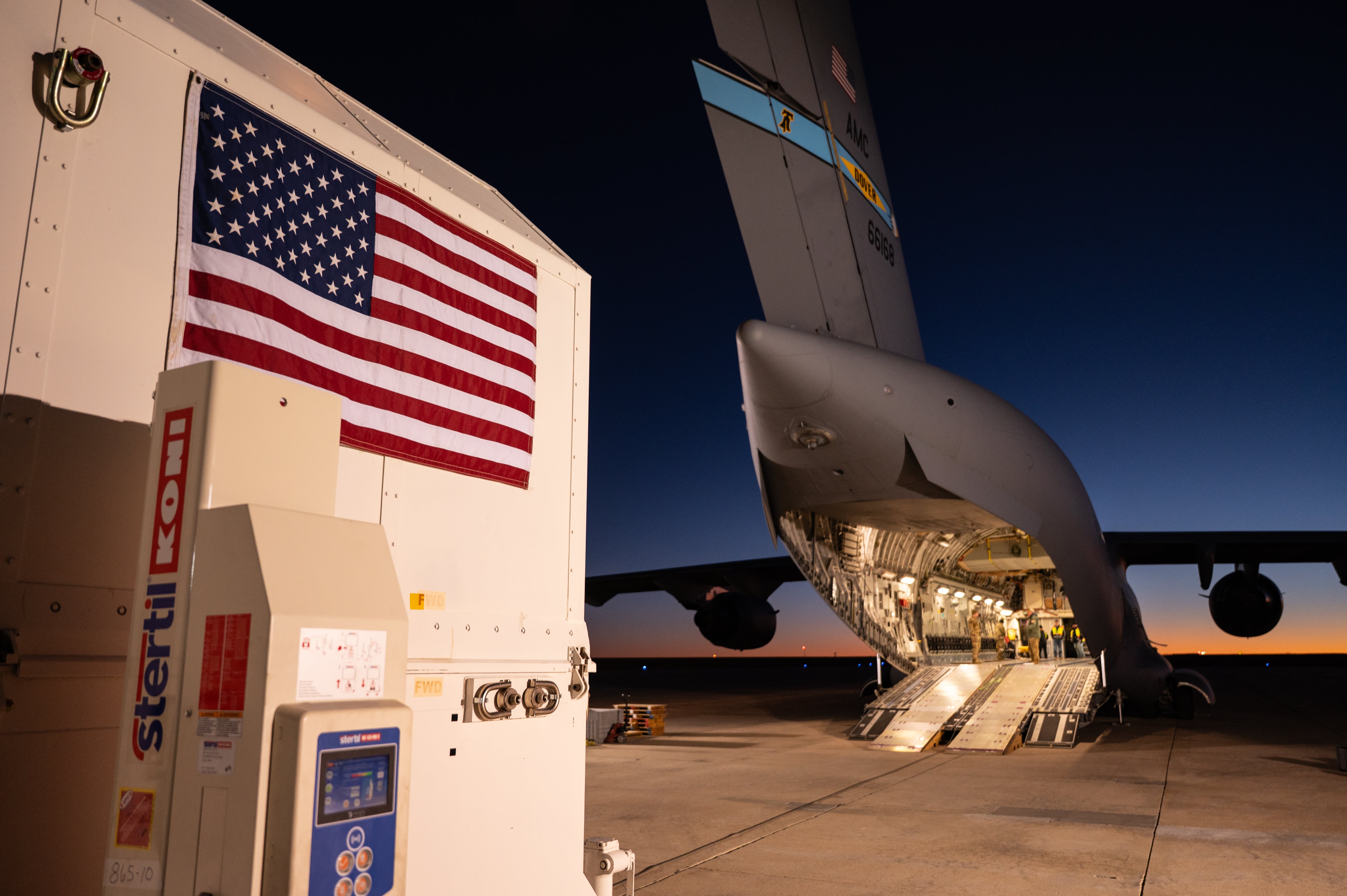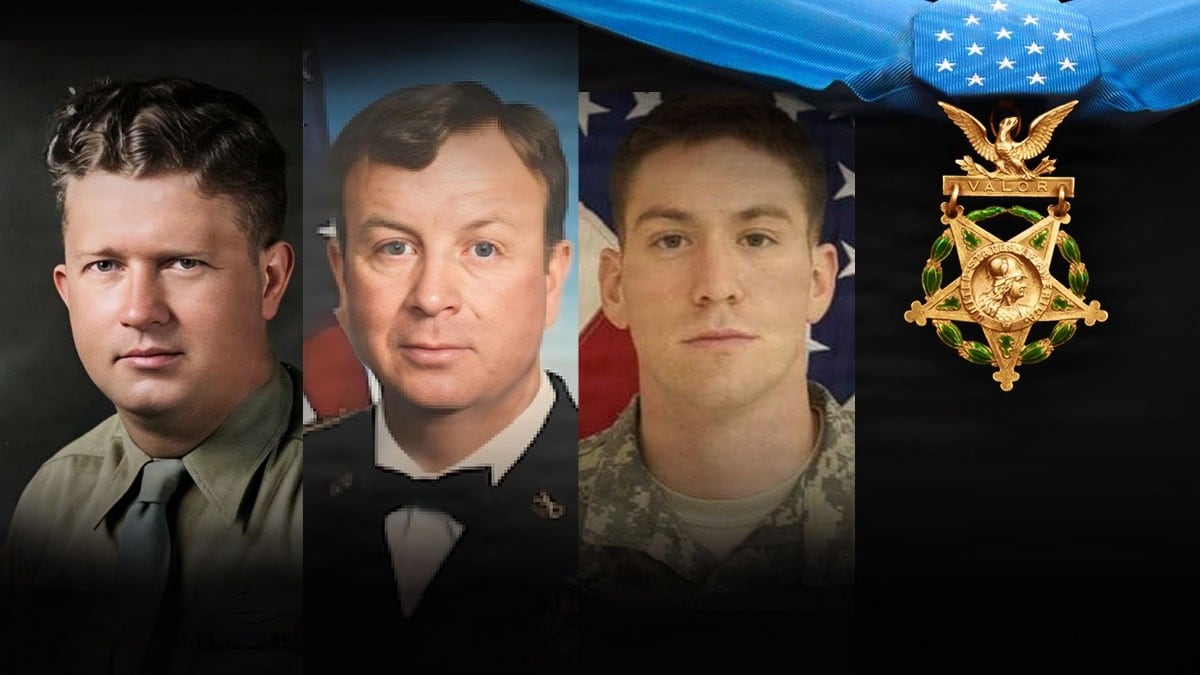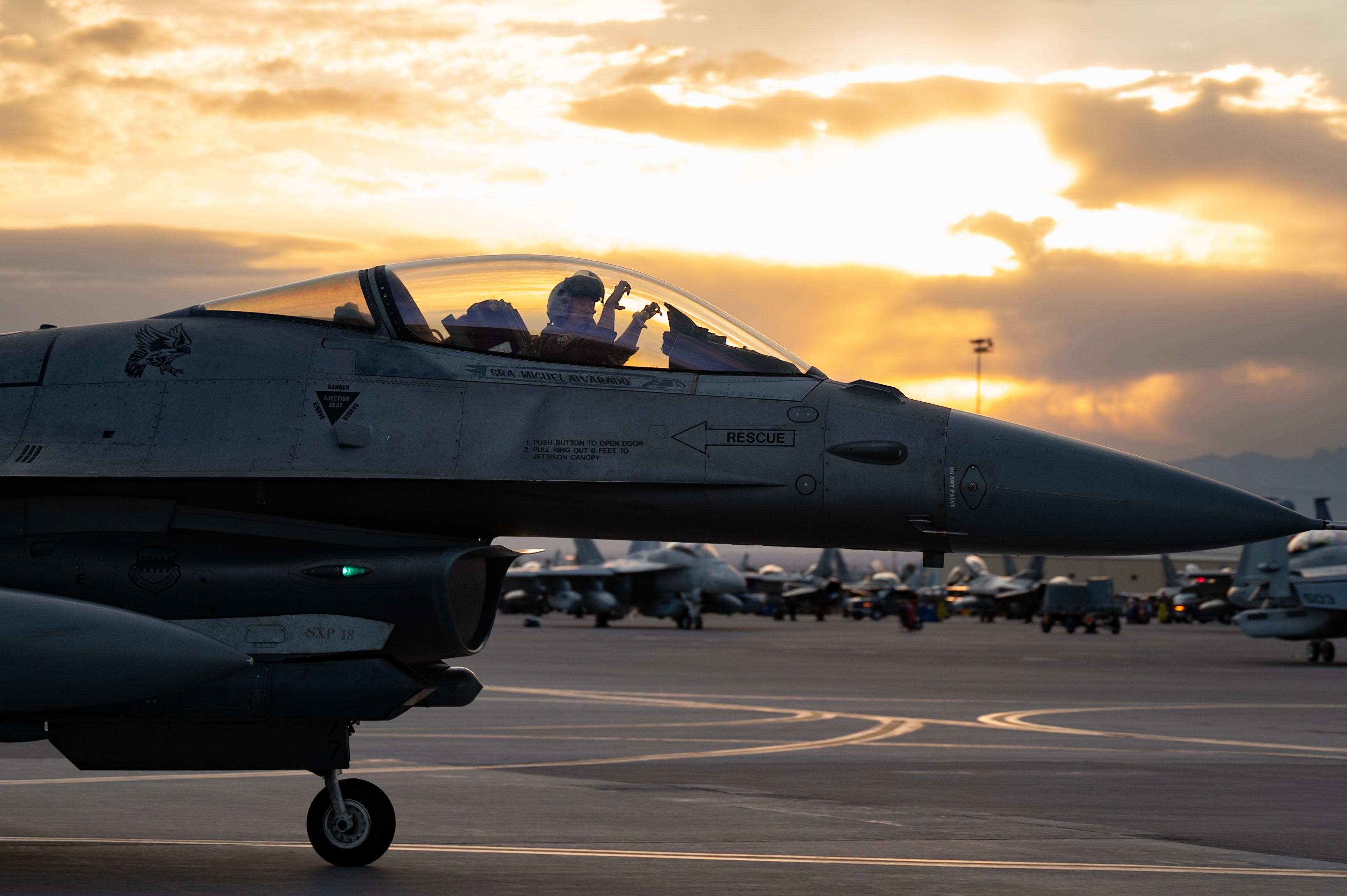source GAIA package: Sx_MilitaryTimes_M6201210201290307_5675.zip Origin key: Sx_MilitaryTimes_M6201210201290307 imported at Fri Jan 8 18:18:05 2016
Tell us:
Email us your thoughts about Lance Cpl. Kyle Carpenter's story. Please include your name, rank and duty station. Your comments could be used as a letter to the editor.
Lance Cpls. Kyle Carpenter and Nick Eufrazio were posting security together on a dusty rooftop in Afghanistan when an insurgent tossed a hand grenade at them. The world melted in a white-hot blast, and the two men were rocked by an explosion that could be heard nearly a mile away.
More than a year later, the Marine Corps continues to investigate what occurred, said Lt. Col. James Fullwood and Capt. Michael Manocchio, who served as two of the senior officers in their unit, 2nd Battalion, 9th Marines, out of Camp Lejeune, N.C., during that deployment. Other personnel in the compound during the Nov. 21, 2010, attack insist there's no doubt Carpenter shielded Eufrazio from most of the blast, and deserves the Medal of Honor.
"Kyle covered that grenade," said Hospitalman 3rd Class Christopher Frend, the corpsman who first rendered medical care to Carpenter and Eufrazio. "Grenade blasts blow up; they don't blow down. If he hadn't done it, what we found would have looked completely different."
The case's profile was first elevated publicly after the state legislature in Carpenter's native South Carolina credited him in a resolution last March with taking "the full blast from an enemy hand grenade in seeking to save a fellow Marine."
Carpenter appeared at a state house ceremony in Columbia in his dress blues, his face streaked with scars he has carried since the explosion. Photographs snapped that day went viral online in patriotic chain emails and on blogs, highlighting sacrifices made by U.S. service members.
Proving Carpenter's actions has been horrendously difficult, however. Carpenter, 22, and Eufrazio, 21, were alone on that rooftop. The former says he doesn't remember what happened in the moments before the explosion. The latter is unable to speak coherently because of brain damage. There were no other eyewitnesses — each of the Marines who responded was in the compound, but unable to see inside the sandbagged guard post.
"The actions that happened on that roof are definitely a matter of interest," said Fullwood, 2/9's former battalion commander. "We've never, from that day until now, stopped trying to uncover what took place, whether it be for reasons of identifying someone who deserves to be recognized with an award or to understand more about the events that unfolded."
Senior leadership also has taken an interest in the case. In the fall, the office of Sergeant Major of the Marine Corps Mike Barrett solicited details about the attack, said Staff Sgt. Michael Kroll, who served as the platoon sergeant during the operation. Barrett had met Carpenter and asked his command for more information about the attack, said Gunnery Sgt. Chanin Nuntavong, a spokesman for Barrett.
The incident stands as a classic example of the cruelty of war. Intentionally or not, Carpenter took the brunt of the blast. His injuries left him clinging to life and badly scarred, but he has battled back after at least 30 surgeries to serve as an inspiration for fellow Marines, who admire his can-do spirit as he pushes through additional treatment at Walter Reed National Military Medical Center in Bethesda, Md.
Eufrazio's story is vastly different. His wounds were less visible, but his long-term prognosis is grim. With steel from the grenade still embedded in his brain, he weighs about 110 pounds, said his father, Mark. He is a patient at the James A. Haley Veterans Hospital in Tampa, Fla.
Carpenter speaks
Carpenter's sense for what occurred is cobbled together in part by talking to other Marines nearby when the insurgents attacked, he said.
"They initiated an attack with two grenades, and then the third one hit me and Nick," Carpenter, of Gilbert, S.C., told Marine Corps Times. "I didn't even know until the beginning or middle of February what the story was, and what my guys saw that day. I didn't even know that because of how traumatic my injuries were and how much I didn't remember. It's frustrating, and I've thought about it for hours on end."
The attack occurred as Carpenter's platoon attempted to set up a new outpost in the region, Patrol Base Dakota. It was named for Lance Cpl. Dakota Huse, 19, a member of Carpenter's platoon who was killed in an improvised explosive device blast about two weeks earlier.
Carpenter, Eufrazio and Huse were all with Fox Company 2/9's 3rd Platoon. The battalion arrived in Afghanistan on July 22, 2010, replacing Lejeune's 3rd Battalion, 6th Marines, in northern Marjah. Located in central Helmand province, the district is now largely pacified, but it was plagued with violence at the time.
Insurgents in Fox Company's area of operations launched regular attacks on Marines as they patrolled through a sprawling network of fields, canals, tree lines and sun-baked farm compounds, Carpenter said. The Taliban occasionally deployed snipers, but most attacks occurred with 7.62mm AK47 assault rifles, the predominant firearm found in the Afghan countryside.
"We always wanted to take the most difficult route because the easiest route, the enemy knows that right off the bat," Carpenter said. "You're climbing down into canals, wading into sewage canals up to your thighs. They'd even flood the fields to make it difficult for you to manage and walk through."
Third Platoon was based at Patrol Base Beatley, in a village known as Mastu Khan. The outpost sat outside Marjah near a sprawling desert used by insurgents to stage attacks, said Manocchio, Fox Company's commander during the deployment.
In the days leading up to the attack that caused Carpenter's injuries, Fullwood, the battalion commander, decided to broaden Fox Company's footprint in the region. Establishing more patrol bases would make it difficult for the Taliban to assert authority, Fullwood said, but it meant braving potential attacks in the process.
"Ultimately, to keep them off-balance, we had to go to where the insurgents were," he said. "If they had a strong point, especially one that was close to an area we were trying to exert influence in, we couldn't allow them to maintain that strong point without going after them and ultimately establishing our influence in that area."
The fight for PB Dakota
That decision prompted the last mission Carpenter and Eufrazio undertook in Afghanistan. Along with other reinforcements, their squad pushed south from Beatley on Nov. 19, 2010, to a small village near where Huse had been killed.
It was a daunting task from the start, Carpenter said. Carrying water, ammunition, food and other gear, the Marines stepped out around 10 or 11 a.m., pushing through fields leading to an area insurgents prowled frequently. Earlier in the year, Marines with 3/6 had sarcastically nicknamed villages in the area Shady, Shadier and Shadiest — and with good reason.
"The further down south you went," Carpenter said, "you were pretty much guaranteed contact."
The Marines planned to establish PB Dakota in Shadier, about three kilometers south of Beatley. They began taking small-arms fire from insurgents about a kilometer south but pressed forward, eventually reaching the compound at about 2 p.m., Carpenter said. The Afghan family inside had agreed to give it up, but the Marines swept it for improvised explosive devices and booby traps anyway.
Carpenter's fellow Marines said they continued to take sporadic fire over the next day. They rotated jobs, with some grunts scanning the surrounding area for Taliban fighters while others filled sandbags. On the second day of the operation, Carpenter was digging a burn pit when an explosion rocked the compound at about 4:30 p.m., he said. The Marines knew an attack was possible, but this blast occurred inside the dusty walls. Another went off a moment later, followed by a third.
They were hand-grenade blasts. Insurgent fighters had crept close enough to the compound to toss them over the walls in a blind attempt to maim Marines inside. It was jarring, Carpenter said. Although enemy hand grenades were a common threat during house-clearing operations in Iraq, they are rare in Afghanistan.
"It was so quick, back to back," Carpenter said. "It was kind of a state of confusion just because if it wasn't an IED, we had never really seen anything else that came from an aerial perspective."
No one was hurt by the first two blasts, but two Marines — Lance Cpls. Bradley Skipper and Jacob Belote — were wounded by the third one. They were evacuated by helicopter, and have since returned to the fleet, Carpenter said.
After the casualties were evacuated, the rest of the Marines returned to work. Evening was closing in, and they needed to prepare for a night in hostile territory. That meant continuing to fill sandbags to build a secure post on the roof of the compound.
The Marines took turns on the roof, placing sandbags under sporadic fire, said Cpl. Charles Stringer, a lance corporal at the time who served as Carpenter's fire team leader. Carpenter was one of the Marines who had the role on the roof, lying flat on his back behind two layers of sandbags as enemy sniper fire cracked overhead.
"Most of our deployment, we were very fortunate to not encounter accurate fire," Carpenter said. "But that sniper, he was pretty on it. There was multiple times where I could hear and feel a round hit the sandbags."
Carpenter compensated by lying behind the sandbags until a shot rang out, then moving quickly to get the next bag. After 15 or 20 minutes, senior Marines on the ground advised him to get down, saying they'd finish after dark, he said.
The timing was key. Stringer and Carpenter both said a rocket, possibly a Chinese-made 107mm round, plowed into the compound a few minutes later, leveling part of the security post they had built. Carpenter had been on the roof just a few minutes before, so Marines who didn't know he had moved into a safer position "expected the worst," he said.
"Where the sandbags were built up, it ruined that area where the post was, but the wall was still standing," said Stringer. He later lost his left leg below the knee following an IED strike a few weeks later, on Dec. 12.
Catastrophe strikes
The fighting cooled off for the rest of the night, but the Marines remained tense. They'd already lost two men to grenade blasts, and had limited supplies left, Carpenter said. Many of the sandbags they had were destroyed in the rocket attack. The roof on which they'd built the security post also collapsed overnight due to the damage sustained.
By the following morning, Nov. 21, the grunts in the compound were back at work. They built another post on the roof of a second building in the compound, with Marines posting security behind the few sandbags the group still had.
Carpenter and Eufrazio took a shift from noon to 4 p.m. that day. After five months in Afghanistan, they knew each other well.
"We grew to be extremely close. He was always our point man," Carpenter said of Eufrazio. "He was always on it. I absolutely trusted him with my life. Over there, we were always together and always looking out for each other, so we decided to take post together."
For more than three hours, their shift passed quietly. Armed with a 5.56mm M4 carbine, a 5.56mm Squad Automatic Weapon and a 7.62mm M240B machine gun, they took cover behind the sandbags and planned for what they would do if an attack occurred.
"We played out all these scenarios," Carpenter said. "Honestly, I can't remember which one of us said this, but I believe I asked him, 'So what happens if a grenade comes up here?' And he said, 'I'm getting the hell out of here.' We kind of even threw it in there like a joke."
Grenades did come, though. The fateful blast tore into Carpenter, mangling his jaw and destroying most of his teeth. He sustained a collapsed right lung, neck injuries, broken fingers and massive trauma to his right arm, which had severe tissue damage and more than 30 fractures, he said. There also was damage to his right leg, and he eventually lost his right eye.
"Everything went white," he said. "I could feel that my eyes were open, but I couldn't see anything. And there was — loud is an understatement — ringing in my ears. I kept saying, 'I'm going to die. I'm going to die.' And my buddies sounded like they were a mile away, even though they said they were screaming in my ears, 'You're not going to die!'"
Several of the Marines were inside a building below the rooftop post when the grenade exploded. There was a thud — possibly the grenade landing — and a second or two of rustling before the blast, they said.
"It sounded like they were wrestling around in the post, and I said, 'What the hell are they doing up there?' " said Kroll, then a platoon sergeant. "Pretty much immediately, the blast went off, and it cracked the roof. By that time, the Marines were already flying up there."
What they saw was horrifying. Frend, the corpsman, said Eufrazio and Carpenter were both unconscious, and Carpenter's face was badly mutilated. He appeared to be dead, and the blast seat of the grenade was under him, said Frend and Sgt. Rudy Najera, a Marine who responded to the blast.
"The smoke was still coming off their bodies when I got to them," said Najera, who served as their squad leader. "I could see the fragmentation in their bodies."
Carpenter almost died three times in the next day as doctors raced to keep him alive and put his body back together.
Eufrazio deteriorates
Life for Carpenter and Eufrazio has taken very different paths in the last year.
Eufrazio, of Plymouth, Mass., is bedridden at the hospital in Tampa, which specializes in the treatment of traumatic brain injuries. His family is frustrated with the medical treatment he has received, said his father, citing a two-week delay in a crucial surgery he needed last spring to relieve pressure on his brain.
The procedure was delayed because Eufrazio had been moved at the family's request from the former National Naval Medical Center in Bethesda to the Spaulding Rehabilitation Hospital in Boston, allowing them to visit him more frequently, his father said.
"They made it sound like he was ready for rehabilitation, but Nick has a traumatic brain injury," Mark Eufrazio said. "We didn't realize that. Nick never should have been flown to Boston. I don't want this ever happening to another Marine or soldier again."
When Eufrazio's brain began swelling, doctors in Boston performed two spinal taps to relieve the pressure. The swelling continued, however, and military doctors told the family that Eufrazio needed to be moved again to the former Walter Reed Army Medical Center in Washington, a move that took two weeks to perform, Mark Eufrazio said.
In Washington, a shunt was installed to drain excess fluid, but Eufrazio's condition deteriorated afterward. He was eventually moved to Tampa, and his family now faces a difficult choice: Find a doctor to perform risky surgery to remove steel from his brain, or prepare for repeated infections that will likely eventually kill him.
"Me and his mother and his brother look at it this way: We want it out," Mark Eufrazio said of the steel. "We want to take that final shot at him being healthy because he shouldn't live like a vegetable in his bed for the rest of his life."
A spokesman for the Navy Bureau of Medicine and Surgery, Navy Capt. Cappy Surette, declined to comment on the specifics of Eufrazio's case, but said BUMED tries to place patients in facilities requested by families when possible to help healing.
A spokesman for the Corps' Wounded Warrior Regiment, Capt. Jill Wolf, said the unit's No. 1 priority is the well-being of wounded Marines and their families.
"We work hand in hand with medical personnel to coordinate treatment and transfer of our Marines to optimize their recoveries, taking medical and non-medical situations into account," she said. "We encourage Marines, family members and caregivers to engage in dialogue with their care team to address any concerns with medical or nonmedical care."
Father questions story
The elder Eufrazio also said his family is hurt that Carpenter appeared at the statehouse in South Carolina as they described him shielding the grenade.
It isn't true, Mark Eufrazio said. He insists Carpenter discussed his memories of the event with him in December 2010, while both Marines were patients in Bethesda. Carpenter told him that Eufrazio was urinating off the roof when the grenade landed, and that Carpenter didn't have time to shield the blast, Mark Eufrazio said.
"I don't want to rain on the kid's parade, but all I remember him saying to me was that he was going to make a bad thing a good situation," he said of Carpenter. "Then all of a sudden, I read bulls--- about how he went right to his statehouse. They [politicians in South Carolina] have no idea what happened that day. If Kyle had laid on a grenade, he wouldn't be here today."
Carpenter said he doesn't remember speaking to him in the hospital, and was heavily medicated at the time. Eufrazio was admired for both his bravery and his caution, Carpenter said. He doubted his fellow Marine would have urinated from a rooftop in such a volatile area, considering all of the enemy weapons they had faced in the previous day.
"Why would a Marine like that, in a terrible area like that, stand there and expose himself to all those weapons we had seen?" Carpenter said. "If someone had a gun to my head right now, I would say there is no way he did that. We didn't even want to stand still to urinate inside the compound. Nick would never, ever do that."
The author of the South Carolina resolution, state Sen. Jake Knotts, acknowledged he did not verify its details with the Corps, but wanted to honor Carpenter's service and sacrifice after discussing the issue with Chuck Williams, the chief deputy sergeant-at-arms for the South Carolina Senate.
Williams, a master sergeant in the South Carolina Air National Guard, first encountered Carpenter a few days after the attack while serving as a chaplain's assistant at Landstuhl Regional Medical Center in Germany. A fellow South Carolinian, he gravitated toward Carpenter, he said. A Marine liaison assigned to Carpenter told Williams about the incident, the master sergeant said.
"He was not expected to live," Williams said. "I can't explain to you how swollen he was from taking that blast. It's miraculous that he's still here with us."
Carpenter steps forward
Carpenter has vowed to push forward, tackling surgery after surgery with long-term plans to either stay in the Corps or go to college to become a history teacher. He has wowed friends and family alike with his optimism and sunny attitude.
He also has become an ambassador for the Marine Corps. In the past few months, he has appeared at several events for the Wounded Warrior Regiment, meeting President Obama, Vice President Biden, Commandant Gen. Jim Amos and other leaders in Washington. A Facebook page tracking his recovery, Operation Kyle, has more than 4,300 fans.
Carpenter also starred in a music video for the rock song "Still in the Fight," by Lt. Col. Mike Corrado. The video has generated more than 35,000 views on YouTube, and the associated song on iTunes raises money for the Fisher House Foundation, which provides free and low-cost housing to veterans and families receiving treatment at military hospitals.
Carpenter said there's no point in wallowing in what happened to him.
"I think for guys who get severely injured and can't move forward, it's because the 'what-ifs' absolutely destroy their recovery," he said. "It's human nature for everyone to say 'what if,' but I try to snap out of it as quickly as I can because I'm never going to be able to go back and change what has happened."
That isn't to say there aren't hard days. Early in his recovery, Carpenter suffered through nightmares in which he couldn't protect loved ones in combat situations, said his father, James. Carpenter also grew frustrated with his inability to write with his injured right hand, and spent hours practicing with his left.
"His attitude actually lifted us up," the elder Carpenter said. "He said, 'Dad, look: I knew this going into the Marine Corps. I knew this could happen to me. I'm alive, and I've got both arms and legs. I'm going to be all right.' "
Carpenter said he felt uncomfortable being recognized by his state government but is thankful for the recognition because it allows him to draw attention to fellow wounded warriors.
"I wanted to put some of the spotlight on 2/9 and the rest of the Marines who were over there with other units," he said. "I wanted to set the story straight and really let people know what it's like and what me and my Marines went through."




